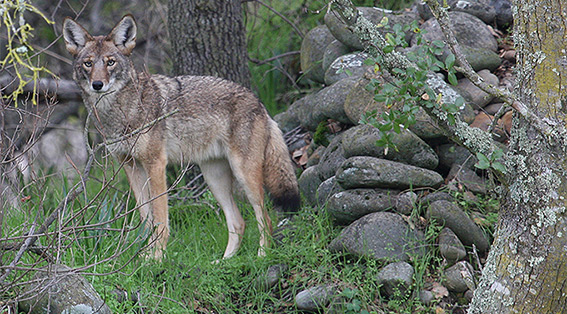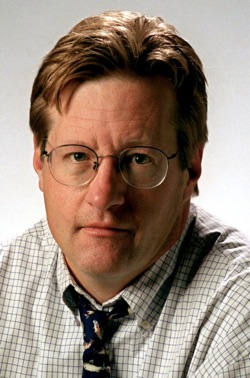
The Bill Lane Center for the American West, Stanford University

Sacramento Bee wins 2013 Knight-Risser Prize
Tom Knudson of the Sacramento Bee has been named the winner of the 2013 Knight-Risser Prize for Western Environmental Journalism for his series titled “The killing agency: Wildlife Services’ brutal methods leave a trail of animal death.”
The $5,000 prize honors excellence in reporting on environmental issues in the North American West.
Special recognition Citation
The judges also gave a Special Recognition citation to the series "Clean Water: The Next Act" by Robert McClure and Jason Alcorn of InvestigateWest and the staff of EarthFix: Ashley Ahearn, Katie Campbell, Courtney Flatt, Aaron Kunz, Cassandra Profita, Bonnie Stewart, Amelia Templeton, David Steves, and Toni Tabora-Roberts.
The Knight-Risser Prize recognizes the best environmental reporting on the North American West — from Canada through the United States to Mexico. The prize includes a cash award of $5,000, and the winner participates in the annual Knight-Risser Prize Symposium, which brings journalists, researchers, scholars and policy makers together with public audiences to explore new ways to ensure that sophisticated environmental reporting survives in the West.
The prize is named for James Risser, two-time Pulitzer Prize winner and director emeritus of the John S. Knight Journalism Fellowships at Stanford. It is co-sponsored by the Knight Fellowships and the Bill Lane Center for the American West, with an endowment from the John S. and James L. Knight Foundation.
The 2012 Wildlife Services project, in articles, slideshows, video and interactive graphics, focuses on a little-known U.S. Department of Agriculture agency whose strategy for controlling animals deemed of risk to agriculture and the public has killed millions of predators and other species across the West, often in ways that are inhumane, excessive and at odds with science.
|
Related: Read about the 2014 symposium honoring Tom Knudson and the Sacramento Bee, featuring a panel discussion on the future of environmental investigative reporting. Includes event video. |
The series also tracks a long history of unsuccessful efforts at reform – and two western congressmen’s current mission to revive those efforts.
“It’s a great example of a regional paper doing something really ambitious,” said David Yarnold, one of the judges and president and CEO of the National Audubon Society. The series and its use of Freedom of Information requests “reflect our best investigative traditions.”
The series itself “an indictment of a government service that is wedded to its culture and does not let results guide its decisions,” added Yarnold, former executive editor of the San Jose Mercury News. Knudson “humanizes the statistics in a way that drives you toward the question: what can be done? And he answers that question ... congressional action followed. Too bad the legislation has stalled for now.”
Judge Emilene Ostlind, a co-winner of the 2012 Knight-Risser Prize, said the stories were “important and meaningful” for revealing the wider implications for the North American West environment.
The judging panel also included Susan McConnell, a professor in the Department of Biological Sciences at Stanford University; Tom Arviso, CEO and publisher of the Navajo Times Publishing Co., and Loretta Williams, a public media journalist based in Los Angeles.
The judges also gave a Special Recognition citation to series "Clean Water: The Next Act" by Robert McClure and Jason Alcorn of InvestigateWest and the staff of EarthFix: Ashley Ahearn, Katie Campbell, Courtney Flatt, Aaron Kunz, Cassandra Profita, Bonnie Stewart, Amelia Templeton, David Steves, and Toni Tabora-Roberts.
The judges noted its comprehensiveness and innovative uses of text, video and audio to give people wide access to information about the state of U.S. rivers, lakes, and bays since passage of the federal Clean Water Act 40 years ago. In the Northwest and nationwide, the stories show, most water bodies still don’t qualify as clean and new threats are outpacing the act’s enforcers.
The Knight-Risser Prize will be awarded at a symposium in early 2014. The event brings together journalists, researchers, policymakers, advocates, students, and the public to explore the environmental issues raised by the winning entry. The prize is co-sponsored by the John S. Knight Journalism Fellowships and the Bill Lane Center for the American West at Stanford, with support from the John S. and James L. Knight Foundation.
Knudson’s three-day series reported that over the past 13 years, more than 50,000 non-target animals have been accidentally killed by steel traps, wire snares and sodium cyanide poison delivered in spring-loaded cartridges. They include federally protected golden and bald eagles and more than 1,100 dogs, including family pets. Humans have also been injured, and 10 people have died in crashes during agency aerial gunning in recent decades.
Although the issues have been raised over and over again, they have gotten scant federal attention. In March of 2012, Congressmen Peter DeFazio ((D-Ore.) and John Campbell (R-Irvine) introduced a bill (HR 4214) to ban the use of spring-loaded sodium-cyanide cartridges. It has sat in committee since then. After the series appeared, they renewed their call for investigative hearings. That has yet to gain any traction.
A key question has been how much the agency is serving the public, or its clients. A large part of its funding comes from the private sector, including the western livestock industry.
“Mammalogists have been railing about this agency for decades,” said Knudson. “It’s a largely opaque, impenetrable organization that has hidden behind a wall of secrecy for far too long. It continues to function largely below the radar, in part because there’s so little known about it.”
Although these are not new complaints, they have rarely been documented in such detail. Knudson said his goal was to gather – and disclose – as much information as possible. To do so, he interviewed scores of people across the West – including former agency employees – filed dozens of Freedom of Information Act requests and asked the agency to allow him to observe its predator-control operations in the field. The agency declined.
“I don’t think in 20 years I’ve ever run into an agency that’s so secretive, so difficult to get information out of,” said Knudson, a two-time Pulitzer Prize winner.
This time, with the help of new technologies, he hopes the issue won’t fade from public consciousness.
“I’ve been a journalist since 1985, and for the first time in my career, I’m able to keep the story alive with twitter feeds. I think this is exciting. In the past, this story would have died.”
He started posting documents about Wildlife Services @tomsplace earlier this year with 18 followers; he now has more than 600 and continues to post new material about the agency and alert his followers.
Knudson said winning the Knight-Risser Prize had special meaning for him. “I’m very grateful today. I was a cub reporter at the Des Moines Register where Jim Risser was a larger than life figure that I looked up to. He was a great inspiration for me to continue dig in to these semi-obscure public agencies.”
James V. Risser was a two-time Pulitzer Prize winner and former director of the Knight Fellowships. The Knight-Risser Prize was established in his name by a group of Knight Fellowships alumni.
One of Risser’s Pulitzer’s was for stories in 1975 that exposed widespread corruption and conflict-of-interest in agencies inspecting U.S. grain shipments abroad. The other, in 1979, was for a yearlong series showing that modern farming practices were damaging the environment through severe soil erosion, depletion of water supplies and contamination by agricultural chemicals.
For More Information
Read about the 2014 symposium honoring Tom Knudson and the Sacramento Bee, featuring a panel discussion on the future of environmental investigative reporting. Includes event video.
The Knight-Risser Prize for Western Environmental Journalism is a joint venture of the John S. and James L. Knight Foundation, the John S. Knight Journalism Fellowships at Stanford and the Bill Lane Center for the American West at Stanford.
The John S. and James L. Knight Foundation supports transformational ideas that promote quality journalism, advance media innovation, engage communities and foster the arts. The foundation believes that democracy thrives when people and communities are informed and engaged.
The John S. Knight Journalism Fellowships is an ambitious catalyst for journalism innovation, entrepreneurship and leadership. Fellows spend their year absorbing knowledge, honing skills and developing journalism prototypes. They leverage the resources of a great university and Silicon Valley while learning from rich interactions with journalists from around the world.
The Bill Lane Center for the American West is dedicated to advancing scholarly and public understanding of the past, present, and future of western North America. The Center supports research, teaching, and reporting about western land and life in the United States, Canada, and Mexico.

Over the past 13 years, more than 50,000 non-target animals have been accidentally killed by steel traps, wire snares and sodium cyanide poison delivered in spring-loaded cartridges. They include federally protected golden and bald eagles and more than 1,100 dogs, including family pets. Humans have also been injured, and 10 people have died in crashes during agency aerial gunning in recent decades.
Texas Tribune, ProPublica

The Desert Sun and USA Today

CPI, InsideClimate News, The Weather Channel

The Seattle Times

The Sacramento Bee

High Country News

5280 Magazine

Seattle Post-Intelligencer

What Went Wrong?
The Seattle Times

San Antonio Express-News

The Los Angeles Times

High Country News




